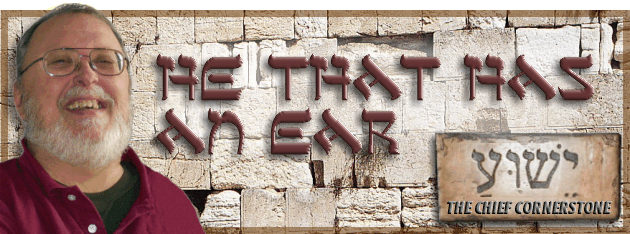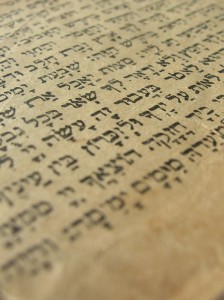Can we do תפילות prayers for:
haRold Smith and his ministry?
So that through them The האור Light, רפואה The Healing and The ואהבה Love of ישועת יהוה Yeshuath YHWH may come back to הארץ The Land of Israel?Difficulty Reading? Click http://hethathasanear.com then on the article for larger type. | |||||||||||
"…let him hear what the Spirit says to the churches. To him who overcomes I will give to eat from the tree of Life, which is in the midst of the Garden of YHVH." Revelation 2:7 | |||||||||||
Part Three - the Church by haRold Smith a citizen of the Commonwealth (Ephesians 2:12) "My people are destroyed forlack of knowledge; because you have rejected knowledge I reject you from being a priest to Me. And since you have forgotten the law of YHVH, I also will forget your children." Hosea 4:6 "…remember all the commandments of YHVH, to do them, not to follow after your own heart and your own eyes, which you are inclined to whore after. So you shall remember and do all my Words, and be holy to YHVH." Numbers 15:39-40 Since words mean things, what terminology we use is important in understanding concepts presented to us in scripture. Christians have typically understood the Bible to be made up of two testaments – the Old and the New. This is an error in translation and in thinking. The word translated testament is the Greek word diatheke (click on highlighted words to view content), and is actually translated as "covenant" more times than it is "testament". The Hebrew word for covenant is beriyth which means "covenant, alliance, pledge". There is also an inference between the words “old” and “new” that what is newest supersedes what is “oldest”. That concept is simply not seen when scripture is viewed from the Hebrew perspective it was written in (see Who's Word Is It? for more insight). The Tenakh or the Original Scriptures are not an “Old Testament.” They make up the completeness of YHVH’s everlasting covenant with Israel. What has come to be known as the “New Testament” is in reality a continuation of that everlasting covenant. They are not two testaments or even two covenants - they are one (see One Covenant for further explanation). If we are to remain students of Truth, it becomes imperative to rid ourselves of words that continue to promote inferences which are in opposition to the Truth contained in scriptural concepts (2Corinthians 10:5). Consequently, these articles use the terms “Tenakh” or “Original Writings” when referring to what has been classically called the “Old Testament” and “Messianic Writings” for what has come to be inappropriately called the “New Testament.” Most Christians see the term "replacement theology" primarily as a reference to "the church" being the anointed replacement for the Yud (Jews) who forsook God - those who "had their shot and blew it" causing them to be cast off from His promises. But would these same Christians be so quick to embrace "replacement theology" if they were aware of the more insidious and underlying implication it carries of actually meaning replacing the Only True Holy One of Israel with something else - a system of thought that divorces Christianity from the historical reality that spawned it? What we serve, what we give ourselves to is what we worship (Matthew 4:10, Deuteronomy 11:16). To see replacement theology for the idolatry it is requires revelation - a paradigm shift in approach to the words of scripture. Throughout scripture, YHVH tells His People to remember Who He is. To believe in YHVH is to remember His Nature shown in and through His Deeds - revelation is history, not theology. The knowledge spoken of in Hosea 4:6 at the top of this article is the knowledge of YHVH's Nature expressed in His Words and Deeds. To be separate from that knowledge is to be destroyed (John 17:3). The previous articles of this series (the Gentile, and the Covering). set forth the scriptural concept that what has come to be known as "the church" to actually have been in existence long before Yom Shav'out (Day of Pentecost) and was known as qahal, the "assembly" - but it was not a "gentile church". Even Sha'ul (the apostle Paul) said so:
Interestingly the NKJV, NASB, NIV, NLT, YLT, ESV and others don't translate ekklesia as "church" in this passage. When the entire chapter is read in context, it is clear that the ekklesia Paul is speaking of isn’t a “gentile church” but Israel! Let's examine yet another verse from the Messianic Writings:
What is being quoted here is taken directly from Psalm 22:22 that reads: "I will declare thy name unto my brethren: in the midst of the congregation will I praise thee." Clearly David is also speaking of Israel – and the author of the book of Hebrews is quoting him. The Hebrew word used for "congregation" in Psalm 22:22 is qahal, (kaf-hey-lamed) meaning "assembly". In the Original Writings, we find this word used well over 100 times and is always translated as “congregation” or “assembly” Perhaps the most interesting thing about this word, however, is that it is always in reference to Israel - but never to gentiles. Every time the word ekklesia is used in the Messianic Writings it never means a “gentile church”.
Subsequently, when the King James version of the Bible was completed in 1611, it had become very important to the crown to retain the word "church" in the text to support the state's authority over it. It was on this premise that King James made fifteen specific edicts (scroll down through the text to see them) that were forcibly applied to that translation. Edict number three stated that this bible was to retain the word "church" in the translation and it was not to be replaced with the word "congregation". He made this a specific edict because he had no authoritative jurisdiction over the congregation (assembly of people) - but he did have that authority over the church (physical buildings). He did not want the word "assembly" associated with the original meaning of the Original Writings which meant "congregation" to prevent an undermining of that authority. He obviously knew the correct translation, but he didn't want it in there in order to retain control over "the church". The proof of this assertion is found in the first English Bible, the Tyndale Bible, translated sometime between 1524 and 1526. The Tyndale Bible never once used the word church. It used the wordassembly or congregation. The Tyndale Bible did use the word "churches" once in Acts 19:37 to describe pagan temples. It is Strong’s #2417 hierosylos and means "guilty of sacrilege". In other words, it means that the hierosulos (translated by Tyndale as churches) is spoiling YHVH's Temple. It is a false temple! Interestingly, this preference for the word “church” was what was passed on to the KJV translation, even though the word used there in Acts 19:37 is NOT ekklesia. The Greek wordekklesia was falsely translated church in the King James Version from a word used to describe pagan temples! The earlier Tyndale version had correctly translated the Greek " ekklesia," as "congregation" rather than "church." It has been asserted this translation choice "was a direct threat to the Roman Catholic Church's claim to be the body of Christ on earth (but as Tyndale made clear, a non-scriptural claim). To change these words was to strip the Church hierarchy of its pretensions to be Christ's terrestrial representative, and to award this honour to individual worshipers who made up each congregation." (ibid, Brian Moynahan, William Tyndale "If God Spare my Life" Abacus, London ISBN 034911532 p72). It is because of his refusal to repent over his translation of the bible and for making it accessible to the public that William Tyndale was burned at the stake by the hierarchy of the Roman Catholic Church. The word for "congregation" in the Greek is "ekklesia" - but since King James forbade replacing this Greek word with "congregation" (the true interpretation), it was replaced with a word which has a totally different meaning. THERE IS NO SUCH ENTITY IN THE SCRIPTURES AS “THE CHURCH”. It is easy to see that what is going on is a perpetuation of REPLACEMENT THEOLOGY by the anti-Semitic gentile “Church” that was founded by Constantine and endorsed by the so called “REFORMERS” (Mark 7:9-13).
YHVH has always had but one assembly and Her Name is Israel. The question of this series has been, “Who is Israel?” - but the more important question is, have you joined her? Or, now equipped with this knowledge - are you going to just keep “doing church”?
Please feel free to email them to me at harold@hethathasanear.com. While not claiming to have all the answers, it would be an honor to share with you what the Spirit is uncovering. | |||||||||||
"Pray for the peace of Jerusalem: They shall prosper that love you." (Psalm 122:6) (prosper - from the Hebrew, "shalav", meaning "to be at rest") Please visit the website http://hethathasanear.com for other articles and videos or for information if you feel led to contribute to this ministry. Click here to watch the short movie Maranatha!. | |||||||||||
Shalom Alechem B'Shem Yeshua HaMashiach. (Peace be unto you in the Name of Yeshua the Messiah) | |||||||||||
| haRold Smith http://hethathasanear.com harold@hethathasanear.com CLICK IMAGE TO VIEW VIDEO |  | Forward this to a friend Click Here to Subscribe | |||||||||
Say Yes to Abba Yahweh and His Laws special in
this time when Abba Yahweh is 'testing' us:
Hab 1:12 Art thou not mikedem (‘everlasting’ also said of
Moshiach, indicating Moshiach’s eternal divine nature: Dan
7:14 And there was given Him
(Moshiach) dominion, and honor, and sovereignty, that all people, Goyim,
tongues, should pey-lammed-chet. [1](worship
as deity) (see Dan 3:12, serve, reverence as deity Him (Moshiach). His dominion
is an everlasting dominion, which shall not pass away, and His (Messianic)
Kingdom that which shall not be destroyed.]see Michoh 5:1[2]; Yahweh Elohai (my
Elohim) Kedoshi (my Holy One)? We shall not die. Yahweh, Thou hast appointed
them for mishpat (ordinance); O Tzur, Thou hast ordained them for reproof.
(Please read the whole book of HaNavi Habakuk)
Please take it serious what Abba Yahweh is telling us in:
Deu 18:15 Yahweh Eloheicha (your Elohim) will raise up unto thee a Navi (prophet) from among thee, of thy achim (bretheren), kamoni (like me Exo 32:30 The next day Moshe said to the people, "You have committed a terrible sin. Now I will go up to Yahweh; maybe I will be able to atone for your sin."); unto him ye must listen;
Please take it serious what Abba Yahweh is telling us in:
Deu 18:15 Yahweh Eloheicha (your Elohim) will raise up unto thee a Navi (prophet) from among thee, of thy achim (bretheren), kamoni (like me Exo 32:30 The next day Moshe said to the people, "You have committed a terrible sin. Now I will go up to Yahweh; maybe I will be able to atone for your sin."); unto him ye must listen;
Deu 18:16 According to all that thou
desired of Yahweh Eloheicha (your Elohimin) Chorev in the Yom HaKahal (day of
the congregation), saying, Let me not hear again the voice of Yahweh Elohav
(your Elohim), neither let me see this eish hagedolah (‘great fire’) any more,
that I die not.
Deu 18:17 And Yahweh said unto me, They
have well-spoken that which they have spoken.
Deu 18:18 I will raise them up a Navi
(prophet) from among their achim (brethren), like unto thee, and will put My
words in his mouth; and he shall speak unto them all that I shall command him
[Yn 10:18].
Deu 18:19 And it shall come to pass,
that whosoever will not listen unto My words which he shall speak Bishmi (in My
Name), I will require it of him.
Joh 8:28 Therefore, Rebbe, Melech
HaMoshiach said to them, When you perform the hagbah (lifting up) of
the Ben HaAdam, you will have da'as (knowledge) that Ani Hu [YESHAYAH
41:4; SHEMOT 3:14-16], and from myself I do nothing, but as HaAv (the Father)
of me taught me, these things I speak.
[1]
Dictionary of the Talmud. M. Jastrow p. 1178 פלח
















No comments:
Post a Comment